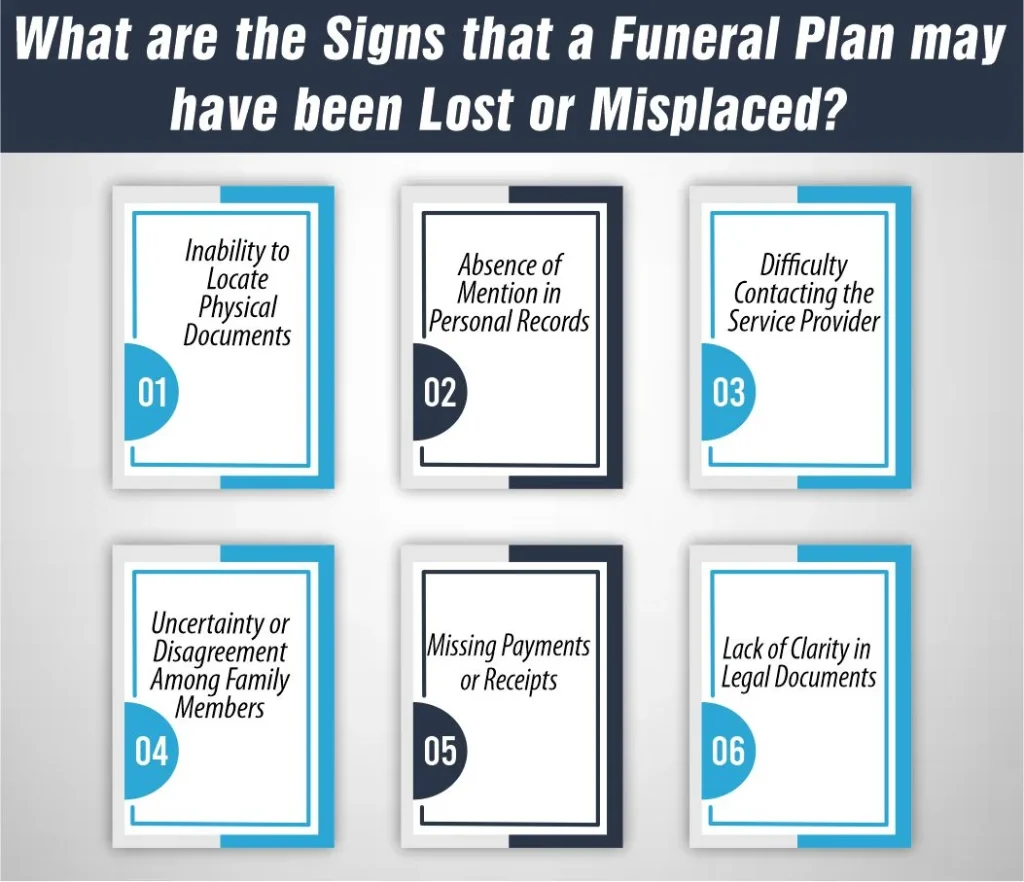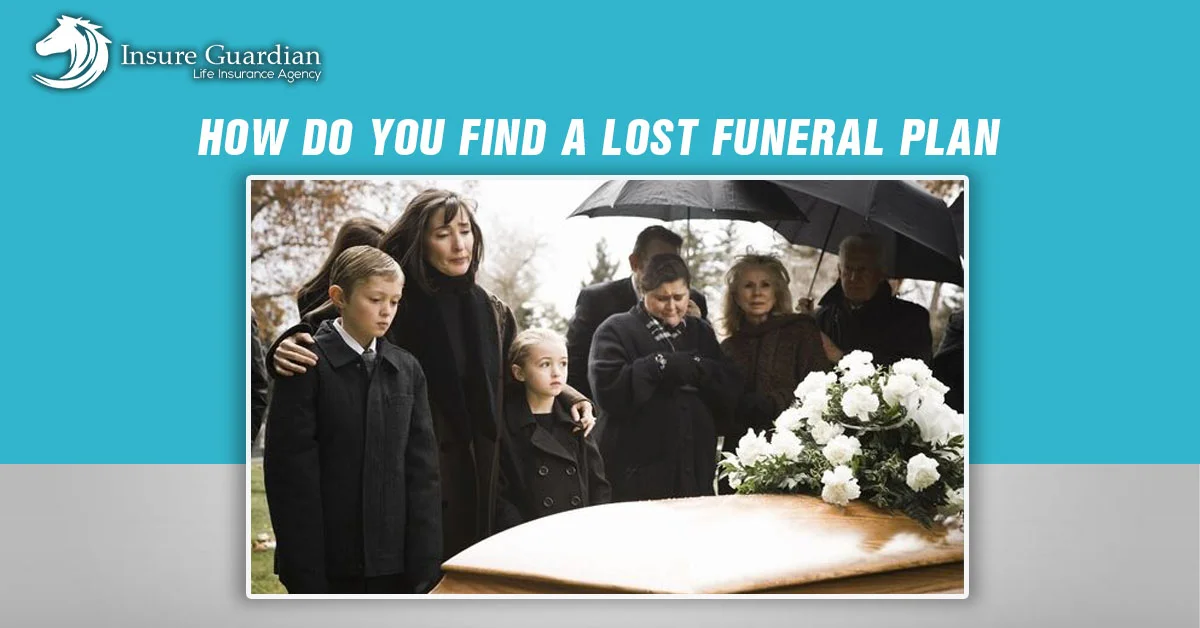Have you ever found yourself searching for something important, only to realize it’s gone missing? Losing track of a funeral plan for a loved one can feel like a daunting task, especially when you’re already dealing with the emotional strain of their passing. In times like these, staying calm and focused is crucial as you embark on the journey to locate the lost document.
In this guide, we’ll explore the query “How do you find a lost funeral plan for loved ones?” From checking physical documents to contacting the funeral home and reviewing online accounts, we’ll cover various strategies to help you navigate this challenging process.
By following these steps and staying organized, you can increase the chance of finding the missing funeral plan and honoring your loved one’s final wishes with dignity and respect.
What is a Funeral Plan, and Why is it Important for End-of-Life Arrangements?
Funeral plans play an essential role in ensuring that a person’s final wishes are respected and honored with dignity. These plans are not just about financial arrangements; they cover a range of considerations that can ease the burden on grieving family members during an already difficult time.
Here are several reasons highlighting the importance of funeral plans:
Financial Preparedness
Funeral expenses can be substantial, and having a pre-planned funeral allows individuals to cover these costs in advance. This relieves the financial strain on family members and ensures that funds are readily available to cover funeral expenses without delay.
Personalization
Funeral plans enable individuals to specify their preferences for funeral arrangements, including burial or cremation, choice of casket or urn, and details of the service. This personalization reflects their unique values, beliefs, and cultural traditions, providing comfort to grieving loved ones knowing that the funeral aligns with the deceased’s wishes.
Reduced Stress
Losing a loved one is a deeply emotional experience, and the added pressure of making funeral arrangements can exacerbate stress and anxiety. By pre-planning a funeral, individuals spare their families from the burden of making difficult decisions during a time of grief. It allows them to focus on supporting one another.
Family Harmony
Funeral plans can help prevent disagreements among family members regarding funeral arrangements. When the deceased’s wishes are documented, there is less room for confusion or conflict, fostering harmony and unity during a sensitive period.
Legal and Administrative Ease
Having a funeral plan in place streamlines the administrative process following a death. It provides clear guidance to family members on whom to contact, what arrangements have been made, and how to proceed, minimizing confusion and ensuring that all necessary tasks are completed efficiently.
Furthermore, funeral plans offer a proactive approach to end-of-life preparations, allowing individuals to exert control over their final affairs and provide comfort to their grieving loved ones. By embracing the importance of funeral planning, individuals can ensure that their legacy is honored with dignity and respect long after they’re gone.

What are the Signs that a Funeral Plan may have been Lost or Misplaced?
When a funeral plan is lost or misplaced, several signs may indicate its absence. These signs can serve as cues to initiate a thorough search for the missing document. Here are some common signs that a funeral plan may have been lost or misplaced:
Inability to Locate Physical Documents
The most obvious sign is the inability to find physical documents related to funeral arrangements, such as contracts, receipts, or paperwork provided by the funeral home.
How Much Does Life Isurance Cost?
Absence of Mention in Personal Records
If there is no mention of the funeral plan in the deceased’s personal records, including financial documents, journals, or correspondence, it may indicate that the plan is missing.
Difficulty Contacting the Service Provider
If attempts to contact the funeral home or service provider listed on the funeral plan are unsuccessful or if there is no record of the plan with the provider, it may suggest that the plan has been lost or misplaced.
Uncertainty or Disagreement Among Family Members
Family members expressing uncertainty or disagreement about the details of the funeral plan, such as the type of service or burial preferences, could indicate that the plan is missing or not easily accessible.
Missing Payments or Receipts
If there are no records of payments made to a funeral home or service provider, it may indicate that the funeral plan documents have been lost or misplaced.
Lack of Clarity in Legal Documents
Reviewing the deceased’s will, trust documents or other legal paperwork may reveal confusion regarding funeral arrangements. It would also suggest that the funeral plan is missing.
If any of these signs are present, it is essential to initiate a thorough search for the missing funeral plan to ensure that the deceased’s final wishes are honored appropriately.
How do you Find a Lost Funeral Plan for Loved Ones?
Losing track of a funeral plan for a loved one can be distressing, but there are steps you can take to locate it. Here’s a guide to help you find a misplaced funeral plan:
- Check Physical Documents: Begin by thoroughly examining physical documents kept in the deceased’s home, including filing cabinets, desk drawers, and designated folders.
- Contact the Funeral Home: If the plan isn’t found at home, reach out to the funeral home where arrangements were made. They keep records of pre-planned arrangements and can guide you further.
- Review Bank Statements: Look through the deceased’s bank statements for recurring payments or withdrawals made to a funeral home or insurance company.
- Search Online Accounts: Check the deceased’s email accounts and online platforms for correspondence or statements related to funeral planning or insurance policies.
- Consult Trusted Advisors: Reach out to the deceased’s trusted advisors, such as their attorney or financial planner, for guidance.
- Review Legal Documents: Examine the deceased’s will, trust documents, or legal paperwork for any funeral-related instructions.
- Contact Insurance Companies: If funded through insurance, contact the insurance company directly and provide the necessary details for assistance.
- Check with Family Members: Reach out to other family members or friends who may know the funeral plan.
- Consider Hiring a Professional: If efforts prove unsuccessful, consider hiring professionals specializing in asset searches or estate planning.
- Stay Organized and Persistent: Keep detailed records of all communication and efforts, staying organized and persistent in your quest.
What are the Common Places to Look for a Lost Funeral Plan?
What places do you have to check while finding your lost funeral plan? Well! To search for your lost funeral plan, it’s essential to check common places where important documents are typically kept. Here are some common places to look for a lost funeral plan:
1- Filing Cabinets
Start your search by thoroughly examining filing cabinets where important documents are often stored. Check each drawer carefully, as the funeral plan may be filed under a different category.
2- Desk Drawers
Check all desk drawers, including those in the deceased’s home office or workspace. Look for any folders or files labeled with the name of the funeral home or service provider.
3- Safe Deposit Boxes
If the deceased had a safe deposit box, it’s worth checking for any documents related to funeral arrangements. You may need to provide proof of identity and legal authority to access the box.
4- Office Spaces
If the deceased had a separate office or workspace, check these areas for any documents related to funeral plans. Look in desk drawers, filing cabinets, and any other storage spaces.
5- Storage Units
If the deceased had a storage unit, it’s worth checking for any documents related to funeral arrangements. Look for a folder or box labeled with the name of the funeral home or service provider.
6- Digital Files
In today’s digital age, many people store important documents electronically. Check the deceased’s computer files, cloud storage accounts, and any other digital devices for any digital copies of the funeral plan.
By checking these common places, you can increase your chances of locating a lost funeral plan and ensuring that your loved one’s final wishes are honored with dignity and respect.
Are there Specific Documents or Records that may contain Information about the Funeral Plan?
When searching for a lost funeral plan, it’s essential to review various documents and records that may contain information about the plan. Here are some documents or records to consider:
- Will or Testament: The deceased’s will or testament may contain information about their funeral wishes, including details of the funeral plan.
- Trust Documents: If the deceased had a trust, the trust documents may outline provisions for funeral arrangements.
- Insurance Policies: Review the deceased’s insurance policies, as they may contain information about pre-paid funeral arrangements or funeral insurance coverage.
- Bank Statements: Look for any payments or withdrawals made to a funeral home or service provider in the deceased’s bank statements.
- Correspondence with the Funeral Home: Check the deceased’s emails, letters, or other correspondence for any communication with the funeral home or service provider.
- Digital Accounts: Review the deceased’s digital accounts, such as email, online banking, or cloud storage, for any digital copies of the funeral plan.
- Contracts or Receipts: Look for any contracts or receipts related to funeral arrangements, as they may contain details of the funeral plan.
How To Make Sure You Don’t Lose Track of a Funeral Plan
To avoid the stress of losing track of a funeral plan for yourself or a loved one, it’s essential to take proactive steps to keep the document safe and accessible. But how you can ensure that you don’t lose records or documents of your funeral plan?
Fear not! Here’s how you can ensure you don’t lose track of a funeral plan:
Organize Important Documents
Create a designated folder or binder to store all important documents, including the funeral plan. Keep this folder in a secure but easily accessible location, such as a locked filing cabinet or fireproof safe.
Communicate the Plan
Ensure that key family members or trusted individuals are aware of the existence and location of the funeral plan. Moreover, share this information with them verbally and provide written instructions if necessary.
Make Copies
Consider making multiple copies of the funeral plan and distributing them to trusted individuals. This ensures that there are backup copies available in case the original document is misplaced or damaged.
Store Digitally
Scan the funeral plan and store digital copies on a secure electronic device, such as a computer, external hard drive, or cloud storage service. This provides an additional layer of protection and accessibility.
Review Regularly
Periodically review the funeral plan to ensure that it remains accurate and up to date. Also, update any changes in preferences or arrangements and communicate these updates to relevant parties.
Inform Professionals
Inform your attorney, financial advisor, or estate planner about the existence of the funeral plan. They can include this information in your legal and financial documents, ensuring that it is considered during estate planning and administration.
Summing Up
A question like “How do you find a lost funeral plan for loved ones” comes with a distressing experience, but with the right approach, it is possible to locate the document and honor your loved one’s final wishes.
Additionally, by following the steps outlined in this guide and considering additional tips, you can easily increase the likelihood of finding the lost funeral plan and navigating the process. Remember to stay organized, patient, and persistent in your efforts, and seek support from professionals or community resources if needed.
References:
https://www.thomasfurber.co.uk/how-to-trace-your-loved-ones-funeral-plan
https://www.thefarewellguide.co.uk/how-to-find-someones-pre-paid-funeral-plan

Expert Life Insurance Agent and health insurance agent
Dylan is your go-to guy for life and health insurance at InsureGuardian. He’s helped over 2,500 clients just like you figure out the best insurance plans for their needs. Before joining us, Dylan was sharing his expertise on TV with Global News and making a difference with various charities focused on health. He’s not just about selling insurance; he’s passionate about making sure you’re covered for whatever life throws your way.






